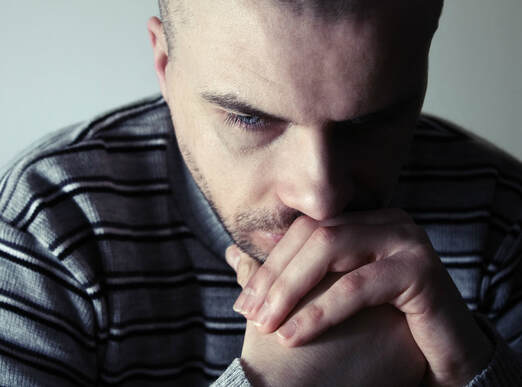How are Trauma & Abuse related to Anxiety and Depression?

Anxiety and Depression are two of the most common effects of trauma.
This is especially true for survivors who experience other physical or emotional effects of trauma, such as chronic pain, sleep disturbances, or anxiety. In some cases, the pain of what a survivor experienced during and after the abuse can seemed unbearable that the brain’s response to coping was to numb emotions altogether. And while this type of survival technique was useful for the child or teen to cope with their trauma, over time such emotional numbness can serve as a gateway to depression.
They may avoid forming or continuing relationships with others in order to protect themselves against further pain, loss, or betrayal. This loneliness can oftentimes facilitate some level of depression, which will heighten feelings of isolation and disconnection further.
Research suggests that by the age of 30, 85% of child sexual abuse survivors experience a mental health issue such as depression. In some cases, the effects of childhood sexual abuse can feel so overwhelming and debilitating that depression may develop as a result.
Many survivors also struggle with feelings of worthlessness, guilt, and self-loathing that stem from their abuse. Over time, these emotions can wear down an individual’s sense of self and reframe how they perceive their role in the world. These negative self-beliefs reinforce the sense of purposelessness that accompanies depression and can make it more difficult for a survivor to break free from a depressive cycle. Some of these beliefs might include:
To learn more about negative self-beliefs and why they are common among survivors, visit here.
Is It Normal to Experience Both Depression and Anxiety?
Despite their seemingly opposing states it’s common to experience the two symptoms as a cycle. For survivors, this cycle is often spurred by anxiety linked to their trauma. Because of the frightening, painful, and confusing experiences they suffered as a child or teen, a survivor’s brain will remain in a state of hypervigilance, always bracing for any signs of danger.
Living with near-constant tension or feelings of dread can feed feelings of anxiety which may persist even when no threat is present. While a survivor is often fully aware that these high levels of distress are making life more difficult, their anxiety will continue to dominate much of their everyday. With this continued, relentless anxiety, a survivor may feel helpless and defeated, which can lead into depression.
At Men and Trauma we understand the connection between Trauma and Abuse to Depression and Anxiety.
You can discuss this with us in complete confidence.
We have an instant booking form you can fill in right now. You'll find all of our services on the booking form. Just tick which service/s you need.
This is especially true for survivors who experience other physical or emotional effects of trauma, such as chronic pain, sleep disturbances, or anxiety. In some cases, the pain of what a survivor experienced during and after the abuse can seemed unbearable that the brain’s response to coping was to numb emotions altogether. And while this type of survival technique was useful for the child or teen to cope with their trauma, over time such emotional numbness can serve as a gateway to depression.
They may avoid forming or continuing relationships with others in order to protect themselves against further pain, loss, or betrayal. This loneliness can oftentimes facilitate some level of depression, which will heighten feelings of isolation and disconnection further.
Research suggests that by the age of 30, 85% of child sexual abuse survivors experience a mental health issue such as depression. In some cases, the effects of childhood sexual abuse can feel so overwhelming and debilitating that depression may develop as a result.
Many survivors also struggle with feelings of worthlessness, guilt, and self-loathing that stem from their abuse. Over time, these emotions can wear down an individual’s sense of self and reframe how they perceive their role in the world. These negative self-beliefs reinforce the sense of purposelessness that accompanies depression and can make it more difficult for a survivor to break free from a depressive cycle. Some of these beliefs might include:
- I don’t matter, so nothing else matters.
- I have no control over anything, just like I didn’t back then. So why even try?
- Given all the pain I’ve experienced, it’s better not to feel anything at all.
- Based on how I’ve been treated before, I’m not worthy of love or support.
- Something terrible always happens. There’s nothing good to hope for.
- If I can’t “handle” my own trauma, clearly I can’t handle anything else in my life.
To learn more about negative self-beliefs and why they are common among survivors, visit here.
Is It Normal to Experience Both Depression and Anxiety?
Despite their seemingly opposing states it’s common to experience the two symptoms as a cycle. For survivors, this cycle is often spurred by anxiety linked to their trauma. Because of the frightening, painful, and confusing experiences they suffered as a child or teen, a survivor’s brain will remain in a state of hypervigilance, always bracing for any signs of danger.
Living with near-constant tension or feelings of dread can feed feelings of anxiety which may persist even when no threat is present. While a survivor is often fully aware that these high levels of distress are making life more difficult, their anxiety will continue to dominate much of their everyday. With this continued, relentless anxiety, a survivor may feel helpless and defeated, which can lead into depression.
At Men and Trauma we understand the connection between Trauma and Abuse to Depression and Anxiety.
You can discuss this with us in complete confidence.
We have an instant booking form you can fill in right now. You'll find all of our services on the booking form. Just tick which service/s you need.
